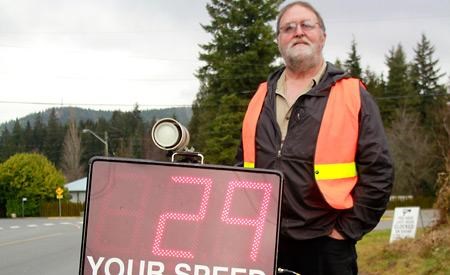They are the eyes and ears for the police. Community policing offices play an integral role as a hub for community-based crime prevention offering programs like Citizens on Patrol (COPs), Block Watch and Speed Watch.
“We’re a link between the community and the police,” said Shirley Goodburn who has volunteered in the Powell River community policing office for the past seven years. “A lot of people walk by the office and don’t know what we do.” Goodburn is happy to answer any questions the public may have and if she does not have an answer readily available, she knows where to find it.
The office is directly linked to Powell River RCMP and located in Powell River Town Centre Mall, which provides the space rent-free. Inside the office there are helpful resources including information about home security, business crime prevention, auto crime prevention, personal safety, fraud information and bicycle safety.
“I believe strongly in volunteering in the community,” said Mary Jean deWitt. “You have to give something back.”
Volunteers in the office are engaged with the community at various functions throughout the year and attend training sessions so they are knowledgable about community resources.
“A lady came in one time,” said Goodburn. “Her teenager was using drugs and she didn’t want to get the police involved but she wanted to get help for him, so I was able to give that advice to her. It’s very rewarding to be able to help people.”
Volunteers are required to maintain confidentiality and do not give the police detailed reports about questions or concerns that are raised. There are approximately 50 offices operating in communities around the province from Burnaby to Burns Lake. Powell River’s started in October 2001 in response to rising incidents of home break-ins and vandalism.
COPs is a program supported through community policing. It is designed to reduce property crime by monitoring areas in the community where residents have requested more patrolling and where history shows crimes are likely to happen. Volunteers are paired up, given a combination cell phone/radio monitoring equipment and patrol in their own unmarked vehicles looking for any criminal activity or reporting crimes in progress. Patrols are usually carried out on Friday and Saturday nights as well as special events such as New Year’s Eve, Halloween and Seafair.
“We do a lot of patrols and they’re all the way from the [Saltery Bay] ferry terminal to the other end,” said Tim Samograd, Powell River’s COPs program chair. Samograd is also involved with the Speed Watch program.
Speed Watch is a program designed to remind drivers about how fast they’re driving, especially in school and park zones.
Samograd spends a few hours each week sitting in his parked car monitoring drivers’ speed. In front of his car is a tripod with a radar device attached to it and an LED board that lights up with a car’s speed as it drives by. A retired deputy sheriff, Samograd tracks the speeds on his tally sheet. At the end of the month he files a report with ICBC (Insurance Corporation of British Columbia) on how many cars are passing by and how many are speeding.
In addition to COPs and monitoring speeding, volunteers also help identify cars that have been left unlocked in the mall’s parking lot, remind people to secure their valuables and on occasion help ICBC look for stolen vehicles by entering licence plate numbers. Recently, a bicycle engraving program has been undertaken to mark bikes to help in their recovery. Every first Saturday of the month volunteers engrave bikes.
The success of each community policing initiative is due to dedicated volunteers. “A lot of the members are retired or semi-retired, so we have a lot of time on our hands,” said Samograd. “We do this to make the community better. The less crime, the easier it’ll be for people here.”
Powell River’s community policing program currently has 36 volunteers, but it is looking to increase that number. “Our numbers are down a bit,” said deWitt. “It’s a great group of people.”
When the program began more than 10 years ago there were over 100 volunteers. “We’re looking to appeal to a new group of people,” she said.
Samograd estimates the number of volunteers needs to be back up to over 100 to be able to run regular weekend patrols.
At a minimum, volunteers are asked to spend four hours per month with the program, but often volunteers spend many more hours.
Constable Chris Bakker, with the Powell River RCMP detachment, is the community policing liaison officer. He said the COPs program has been a success. “We were looking for a young male who was thought to be suicidal,” said Bakker. “We had two cars out looking for him and we sent his description to the COPs as well. It was the COPs that found him. Everything turned out good. We got him the necessary help. It’s just nice to have those extra cars on the road, especially for something like that.”
Readers who are interested in volunteering can find application forms at the community policing office. To be eligible, volunteers must be between the ages of 19 to 80 years old, be of good character and able to pass an RCMP background check. Volunteers are expected to attend training and meetings as required. The community policing office can be called at 604.485.8567.



